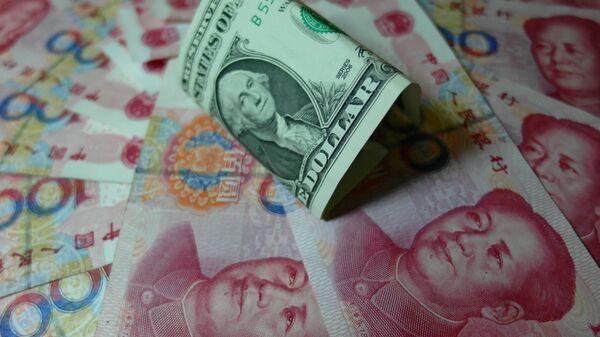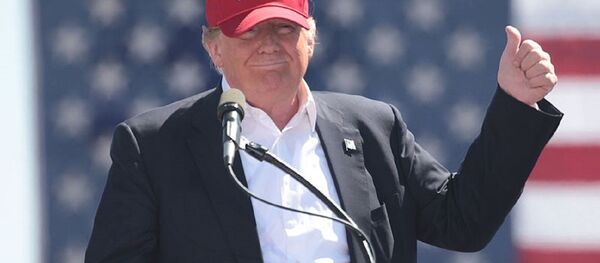Donald Trump's assertiveness in the ongoing US-China trade war has prompted speculations about Beijing's apparent countermeasures.
Thus, Business Insider surmised that China could dump US Treasury bonds in an asymmetric response to Trump's tariff spree. Citing the fact that Beijing holds $1.18 trillion worth of bonds, the media outlet suggested that by selling US Treasuries, China could deal a tangible blow to the US economy and the dollar.
Other observers believe that Beijing could go even so far as to devalue its currency. Jim Rickards, a media commentator and author of "Currency Wars," claimed, "If Trump imposes 25 percent tariffs on Chinese goods, China could simply devalue their currency by 25 percent" and crash US stock markets.
Sputnik got in touch with Tom McGregor, a Beijing-based political analyst, an Asia-Pacific commentator and senior editor for China's national TV broadcaster CCTV, asking him to comment on the issue.
Dumping US Treasury Bonds
"Does Beijing wish to collapse the Chinese economy just to win trade wars against Washington? I don't think so," McGregor responded. "Just imagine if China cashed out on its US Treasury bonds. The US might default on paying its full debt to Beijing and that means over US$1 trillion would disappear. China would no longer have access to that money."
On the other hand, "Trump could issue a court injunction preventing China from selling out on all its US Treasuries and the legal proceedings could take years before there's a settlement," he suggested, adding that "meanwhile, there would be a global financial panic and money stops flowing between all countries while waiting for a judge to resolve the matter."
"Hence, the strategy for China to sell all its US bonds would result in more harm than good for the Chinese economy," McGregor said.
Devaluation of Yuan
"The real truth is that the US economy is getting much stronger and hence more foreign capital is flowing into US markets," McGregor pointed out. "The Chinese economy is starting to weaken and hence people are moving more currency out of the country and much of that money is flowing into the US. Hence, the valuations show that the US dollar is strengthening against the Chinese yuan."
He explained that currently the Chinese government "tends to put tight restrictions on its currency, such as restricting outflows of the yuan to other nations." The commentator noted that when Beijing "wishes for its currency to weaken, they loosen such restrictions so it's much easier to take Chinese money out of the country."
"In other words, by weakening its currency, there's less money in China, because cash flows are streaming beyond its borders, [which means] yet again, causing harm to itself in order to fight trade wars against the US," he elaborated, highlighting that "if the yuan loses 25 percent in value against the dollar that would have a devastating impact on the Chinese economy."
McGregor emphasized that the Chinese government is not foolish and not going to shoot itself in the foot: "If Beijing responds with extreme measures then the whole world, including China, will enter an age of a severe global depression. Does China want that? The answer is no."
Tightening the Screws
So, what measures is Beijing likely to take to counter Trump's trade offensive?
"Beijing could respond by increasing tariffs on all US imports and impose measures to prevent American companies from conducting business in China, but I don't see that happening in the near future, because that would create a shock to the Chinese economy and demonstrate desperation on the part of Beijing," McGregor opined, suggesting that the Chinese leadership may "take a more gradual approach to inflict penalties on the US market, just like tightening the screws."
However, according to McGregor, that won't happen. He believes that "Trump will respond with even tougher measures against China if that happens."
"China has more to lose than the US in trade wars, so it's better for Beijing to seek a more conciliatory manner from Washington," the commentator presumed. "If they shut down trade with the US then they lose hundreds of billions of US dollars in exports. How can its economy continue to enjoy high economic growth rates?"
"It's better for them to stop acting stubborn and find areas for negotiations to delay the onset of new tariffs that are expected to be imposed on them by Washington," McGregor emphasized.
The views and opinions expressed by the contributors do not necessarily reflect those of Sputnik.




